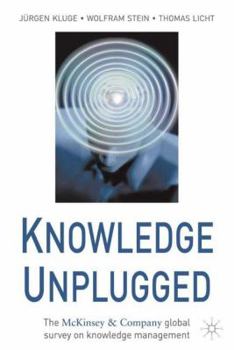Knowledge Unplugged: The McKinsey Global Survey of Knowledge Management
Select Format
Select Condition 
Book Overview
Knowledge Unplugged announces the results of a major survey on knowledge management practice within the most influential companies in the world, by the most influential management consultancy group in the world. The McKinsey Knowledge Management team interviewed top executives and also investigated how far their plans were implemented in practise, in 40 companies in the US, Europe and Japan. In many companies they discovered a significant gap between the vision at the top and the reality on the shop floor. Knowledge Unplugged draws together their findings and presents a practical guide to improving knowledge building and sharing at all levels within an organisation, vividly illustrated with case studies of best practice and common pitfalls. It also goes further and challenges companies to abandon convention and to liberate Knowledge Management from the hands of the IT department They argue that Knowledge management is much more than simply installing a new database and can only be successful when it is at the heart of everyday personal exchanges, personal incentives and personal responsibilities at every level of the firm.
Format:Hardcover
Language:English
ISBN:0333963768
ISBN13:9780333963760
Release Date:July 2001
Publisher:Palgrave MacMillan
Length:213 Pages
Weight:1.33 lbs.
Dimensions:0.7" x 6.3" x 9.5"
Customer Reviews
2 ratings
A good KM introduction for managers.
Published by Thriftbooks.com User , 18 years ago
The concepts in Knowledge Unplugged are nothing particularly new, if you are familiar with the area of Knowledge Management. Written in 2001, it is a good survey of the thinking around the subject that was current in the 1990s. This is not to imply that the book is not valuable now. Practitioners should find the metrics from the McKinsey global survey valuable, even if the treatment of the concepts feels as though it may lack the more detailed current understanding. I would particularly recommend the book as an introduction to an interested executive who wanted to understand KM basics. The clear language and underlying survey support would make it a good way to begin a dialogue on the subject. I found the emphasis on sharing and reuse as a learning opportunity for the rest of the company particularly relevant and well-explained.
DECENT EXPOSE OF KNOWLEDGE CHARACTERISTICS
Published by Thriftbooks.com User , 21 years ago
Suited to deeper thinking operations managers and KM practitioners. Geared to globalised players who have the resources.Until we can grasp the nature of knowledge we are foolishto think we can setup systems to leverage it. The McKinsey book is one of the very few in KM to specialise in identifying and measuring the knowledge characteristics in companies('...the six characteristics that distinguish it from other assets..'p.21). It is the only one to my extensive knowledge that provides scientific results from their survey ('We found a strong correlation between a company's knowledge index and ...'P.19). Both are worthy contributions to the literature.Example of typical chapter : Chapter 4 is about 'Subjectivity: Reading From The Same Page.'Breakdown:Six sub-sections of Strategies to minimise(!)subjectivity.- major issue. Sub-Section 1. Build Common Experiences - -identifiable issues, -case1-'An automotive company.. (1 page) -summary Sub-Section 2. Generate an Open Knowledge Flow Across Hierachies - -identifiable issues, -case2- 'A European capital goods..(3/4ths page) -case3- '..an automotive supplier..(1/2 page) -summarySub-Section 3. Break the Status Barrier -identifiable issues, -case4- 'One global automotive..' (1/2 page) -case5- 'At Oticon, a Danish...' (1/2 page) -case6- Full study on Oticon (1 1/2 pages) -summarySub-Section 4. Get the Experts Together -identifiable issues, -case7- 'One US investment goods...' (1/2 page) -case8- 'To expand the Oticon example..'(1/3 page) -strategies explanations (2pages) -survey findings/summarySub-Section 5. Synchronize High-Level Goals -identifiable issues -case9- '..an international conglomerate..' (3/4 page) -strategies explanations (1/4page) -case10- 'At an international telecoms equipment..' (1/2page)Sub-Section 6. Chapter summary (1 page)Survey Results Pertaining to Subjectivity.In addition, a chapter explaining First Steps...preliminary KM questionnaire.Formatting & Writing Style: No diagrams but survey bar graphs.Page font and spacing- generous and readable.Almost no bullet points in the entire book, making it difficult to isolate key points ! Nice sub-headings, good analogies, illustrations and loads of mini-case studies spread out with a dozen lengthier case studies. Conclusion : Holistic, deeper thinkers will see this as a valuable resource to develop a company KM framework.Spiro Raftopoulos






